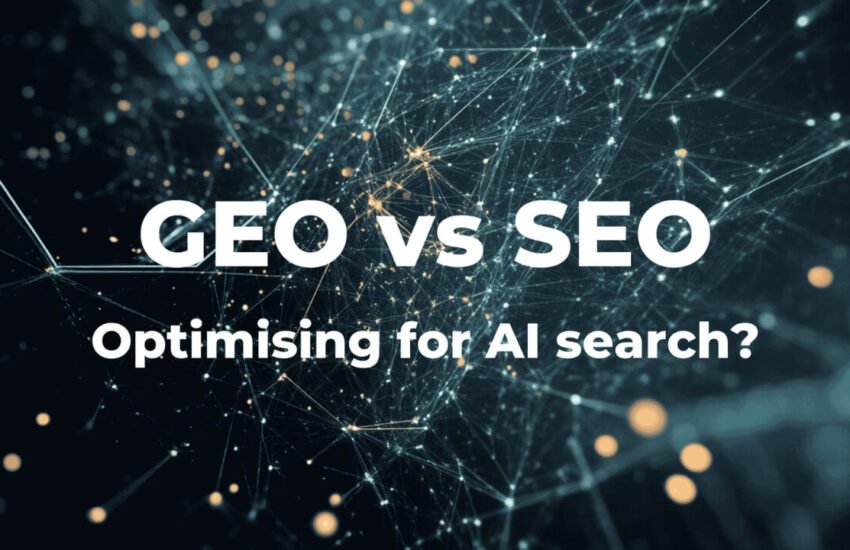With the advancement of search technology, SEO (Search Engine Optimization) remains beyond the traditional search engines such as Google and Bing. The introduction of generative AI tools such as ChatGPT and Perplexity has created another problem business owners will have to solve, GEO (Generative Engine Optimization). Whether GEO will replace SEO, or remain something of a new dimension of search engine optimization in an evermore multi-platform, multi-modal world is being wondered by many. Here in the blog we shall be discussing on how GEO is transforming the evolving scenario of digital marketing, when it comes to be incorporated in the larger picture of SEO and why SEO is not dead.
What is GEO: The New Search Frontier
Before coming into the debate whether GEO will push aside SEO or not it is necessary to know what GEO is and how it compares to the regular SEO.
SEO traditionally has been about tuning content to search engines such as Google and Bing so that the sites get good listings in traditional search results pages (SERPs). GEO, though, is the act of optimizing content to generative A.I. technology like ChatGPT and other large language models (LLM) that are increasingly becoming ingrained parts of how users find information.
Generative AI-based tools may reply to queries in natural language (e.g. conversational) form and provide detailed responses, summaries or new material, hence halting the distance between a query and its result, made by a user. With the increasing popularity of these tools, it would require the businesses to streamline their policies and strategies to suit this new brand of search including GEO with conventional SEO.
SEO vs. GEO, Same Mission, Different Media
GEO and SEO could be perceived as unrelated search engine optimization strategies, but they both have one common target, i.e., assisting users to get the most suitable answers to their queries. The major variation is in platforms and algorithms powering the search result.
SEO prioritizes web presence through utilizing traditional search engines so that information can be seen on the organic search. GEO is instead a concept that is concerned with optimizing the content to AI-powered search engines and other multi-modal mediums where users experience more dynamic and conversational search activities.
Nevertheless, these two strategies echo the same main ideas:
- Admittedly the user intent.
- Delivery of quality offering contextual content
- Seamless retrievability of content: making content easily retrieved.
- Creating online authority
As AI-enhanced search engines are increasingly incorporated into many different platforms such as websites, social media, and even home automation devices, SEO and GEO will also have to go hand in hand with one another.
Whether GEO will Displace or fit into SEO?
It is believed that SEO is to be defeated by GEO in the near future. The fact is that SEO is evolving not dying. With the use of AI-powered tools redefining search practices, SEO strategies are also being further developed to optimize the content to generative search engines. GEO is also gradually integrating into the two strategies, and the main idea is that GEO is an inevitable addition to the traditional SEO.
The reason why SEO will not die but will become a part of GEO is the following:
- Search is going multi-platform: Users search on their mobile phones, smart TVs and voice assistants, just to name a few. SEO technique undergoes development so that content will also fare well in the old-style of search engines as well as the new AI-based interfaces in various platforms.
- Multi-modal search: With generative AI, the user can use voice, text and even pictures to communicate with the search engine. With multi-modal search being embraced the practice of both SEO and GEO will have to collaborate to^*_ burden in order to achieve discoverability of content across the various types of interaction.
- The emergence of conversational search: As AI-driven search engines such as ChatGPT have begun to provide detailed, conversational information on the responses they give to user queries, GEO is becoming a necessity to businesses wishing to attract users to this new form of search.
As SEO can be expected to keep focussing on conventional search, GEO is gaining speed as an inevitable element of search optimization. AI does not mean that SEO died; however, it is an evolutionary move of how search engines work and how users interact with them.
Multi-Platform, Multi-Modal Searching Future
With search engines changing, one sees plainly that the future of SEO is multi platform and also multi modal. Search has become beyond searching text in desktop computer. The users now use search engines on diverse platforms, including voice assistants, smartwatch, and smart TVs, which have different optimization practices.
In such a multi-modal world, how can SEO keep up and make content that works in all of this?
This includes:
- Voice search: Voice search Google Assistant, Siri, and Amazon Alexa are becoming common and to ensure that your business remains relevant and easily discoverable, then, you will need to optimize content to appear in voice search recommendations.
- Visual search: More so, users are working with visual search solutions, such as Google Lens, where users can find information according to the image. Seek to optimise visual elements such as alt text on images and video transcripts to help sustain search presence.
- AI-driven search bots: The ability of the generative AI will offer the user an answer in a conversational style and thus businesses will be forced to adjust their content so that it fits into this new method.
Big Ideas of incorporating GEO into Your SEO Program
The companies that lie in pursuit of the exigent competition within the fast-changing search environment should begin to employ the GEO best practices in their SEO practices. The following are practical ideas which would assist you in getting started:
Content Creation:
- Pay attention to creation of abundant, natural content that responds to questions of users.
- Make use of anchor links and readable headings so it is easy to navigate around the content.
- Revise and trim low performers.
Link Building:
- Audit the relevance of backlinks or internal links with tools such as Screaming Frog.
- Internal links should be built to core and evergreen pages to reinforce a content cluster.
Technical Optimization:
- Make your content crawlable and indexable and include structured data such as FAQ and schema to drive content awareness.
- Ensure multimedia like audio, images and videos have metadata: image alt tags, video transcripts that can be indexed by AI-based searching engines.
- Accelerate page performance and rendering so as to produce fast content delivery.
Cross-Platform Strategy:
Optimize across multiple search infrastructure such as social media (TikTok, Pinterest), forums (Reddit, Quora), and voice assistants since all of these are sources of generative AI search queries.
The Future of the SEO: Unified Strategy GEO
Due to the fact that AI remains to be a dominating factor in the search field, combining it with GEO is something companies should see as an enhancement of their SEO initiatives. There is a blurring of the line between what was once referred to as a traditional search and an AI driven search engine and the SEO experts should be ready to adapt to this emerging age of multi platform and multipolar search optimization.
GEO is not going to replace SEO but instead, it will form an important part of the bigger picture that surrounds search everywhere optimization. Moreover, in response to the changing digital environment, agility and adapting to new and emerging technologies will be what keeps search visible and relevant in response to AI as the technology continues to evolve.
Recommendation: GEO would be Integrated into your SEO Operation
The emergence of GEO is not death of SEO, but growth of it. Incorporation of GEO in business, along with the conventional SEO procedures is critical because AI-powered search engines change the rules of the game of locating information. As search goes multi-platform and multi-modal, the issue of having a comprehensive approach that combines both SEO and GEO will be needed to remain competitive. Through generative engine optimization, companies reaping its benefits would be more confident that they are fit to carve future search.
you may also like
Google Warns Enterprises with using generic keywords in domain names



